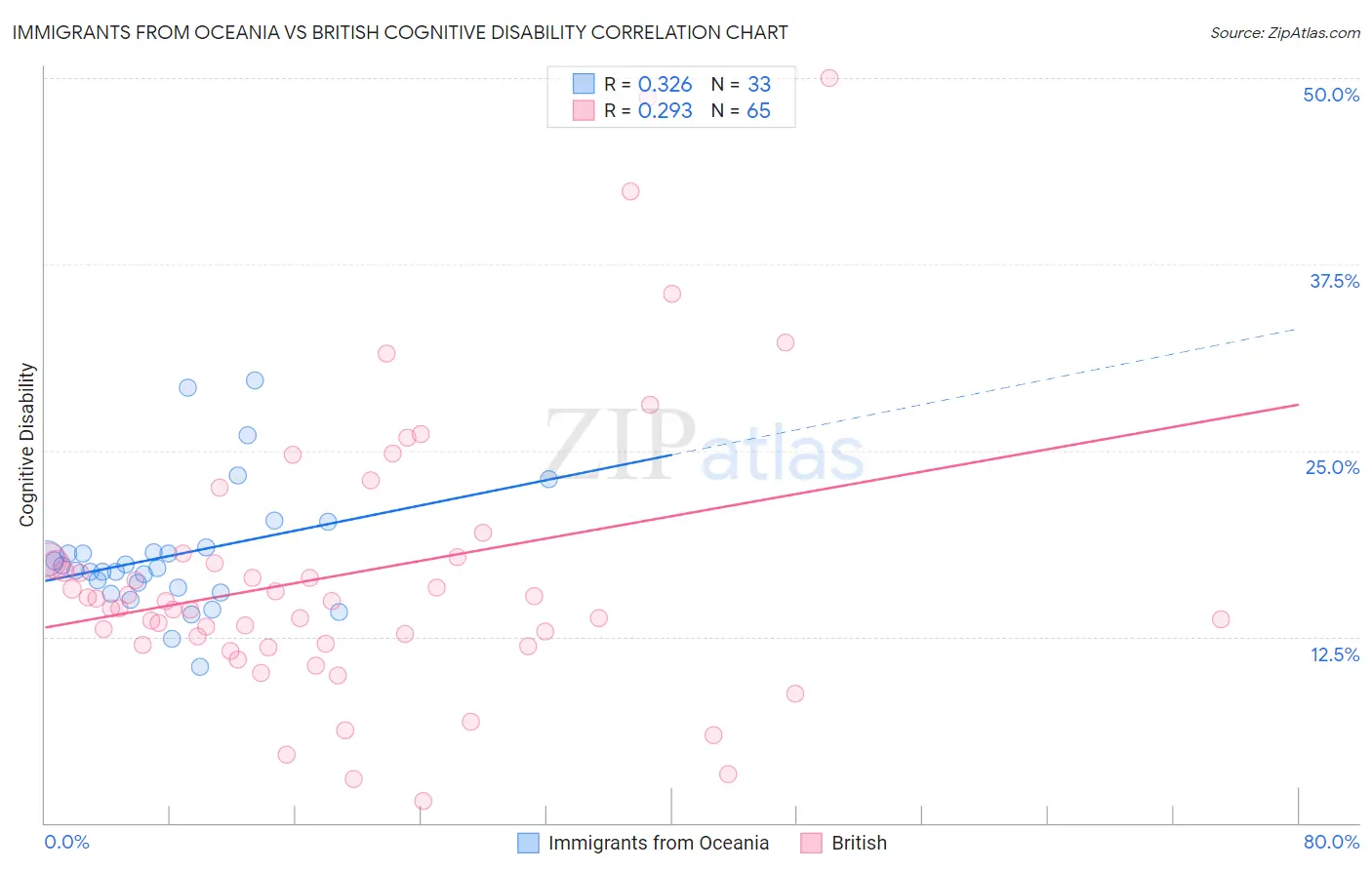Immigrants from Oceania vs British Cognitive Disability
COMPARE
Immigrants from Oceania
British
Cognitive Disability
Cognitive Disability Comparison
Immigrants from Oceania
British
17.6%
COGNITIVE DISABILITY
7.3/ 100
METRIC RATING
212th/ 347
METRIC RANK
17.0%
COGNITIVE DISABILITY
89.3/ 100
METRIC RATING
143rd/ 347
METRIC RANK
Immigrants from Oceania vs British Cognitive Disability Correlation Chart
The statistical analysis conducted on geographies consisting of 305,496,536 people shows a mild positive correlation between the proportion of Immigrants from Oceania and percentage of population with cognitive disability in the United States with a correlation coefficient (R) of 0.326 and weighted average of 17.6%. Similarly, the statistical analysis conducted on geographies consisting of 531,402,976 people shows a weak positive correlation between the proportion of British and percentage of population with cognitive disability in the United States with a correlation coefficient (R) of 0.293 and weighted average of 17.0%, a difference of 3.4%.

Cognitive Disability Correlation Summary
| Measurement | Immigrants from Oceania | British |
| Minimum | 10.5% | 1.5% |
| Maximum | 29.7% | 50.0% |
| Range | 19.2% | 48.5% |
| Mean | 18.0% | 16.7% |
| Median | 17.1% | 14.9% |
| Interquartile 25% (IQ1) | 15.6% | 12.0% |
| Interquartile 75% (IQ3) | 18.3% | 17.7% |
| Interquartile Range (IQR) | 2.7% | 5.7% |
| Standard Deviation (Sample) | 4.2% | 9.5% |
| Standard Deviation (Population) | 4.1% | 9.4% |
Similar Demographics by Cognitive Disability
Demographics Similar to Immigrants from Oceania by Cognitive Disability
In terms of cognitive disability, the demographic groups most similar to Immigrants from Oceania are Hawaiian (17.6%, a difference of 0.010%), Taiwanese (17.6%, a difference of 0.040%), Immigrants from El Salvador (17.6%, a difference of 0.040%), Alaskan Athabascan (17.6%, a difference of 0.050%), and Okinawan (17.6%, a difference of 0.050%).
| Demographics | Rating | Rank | Cognitive Disability |
| Puget Sound Salish | 10.9 /100 | #205 | Poor 17.5% |
| Alaska Natives | 10.4 /100 | #206 | Poor 17.5% |
| Immigrants | Latin America | 9.7 /100 | #207 | Tragic 17.6% |
| Immigrants | Cameroon | 9.3 /100 | #208 | Tragic 17.6% |
| Immigrants | Trinidad and Tobago | 8.7 /100 | #209 | Tragic 17.6% |
| Immigrants | Jamaica | 8.5 /100 | #210 | Tragic 17.6% |
| Taiwanese | 7.7 /100 | #211 | Tragic 17.6% |
| Immigrants | Oceania | 7.3 /100 | #212 | Tragic 17.6% |
| Hawaiians | 7.2 /100 | #213 | Tragic 17.6% |
| Immigrants | El Salvador | 7.0 /100 | #214 | Tragic 17.6% |
| Alaskan Athabascans | 6.9 /100 | #215 | Tragic 17.6% |
| Okinawans | 6.8 /100 | #216 | Tragic 17.6% |
| Salvadorans | 6.7 /100 | #217 | Tragic 17.6% |
| Icelanders | 6.4 /100 | #218 | Tragic 17.6% |
| Immigrants | Sierra Leone | 6.3 /100 | #219 | Tragic 17.6% |
Demographics Similar to British by Cognitive Disability
In terms of cognitive disability, the demographic groups most similar to British are Immigrants from Brazil (17.0%, a difference of 0.0%), Carpatho Rusyn (17.0%, a difference of 0.020%), French (17.0%, a difference of 0.050%), Chilean (17.0%, a difference of 0.050%), and Aleut (17.0%, a difference of 0.050%).
| Demographics | Rating | Rank | Cognitive Disability |
| Israelis | 91.0 /100 | #136 | Exceptional 17.0% |
| Immigrants | Norway | 90.9 /100 | #137 | Exceptional 17.0% |
| Welsh | 90.8 /100 | #138 | Exceptional 17.0% |
| French | 90.0 /100 | #139 | Excellent 17.0% |
| Chileans | 89.9 /100 | #140 | Excellent 17.0% |
| Aleuts | 89.9 /100 | #141 | Excellent 17.0% |
| Carpatho Rusyns | 89.6 /100 | #142 | Excellent 17.0% |
| British | 89.3 /100 | #143 | Excellent 17.0% |
| Immigrants | Brazil | 89.3 /100 | #144 | Excellent 17.0% |
| Immigrants | South Eastern Asia | 88.7 /100 | #145 | Excellent 17.0% |
| Costa Ricans | 88.0 /100 | #146 | Excellent 17.0% |
| Scotch-Irish | 85.9 /100 | #147 | Excellent 17.1% |
| French Canadians | 85.7 /100 | #148 | Excellent 17.1% |
| Cypriots | 85.7 /100 | #149 | Excellent 17.1% |
| Basques | 85.5 /100 | #150 | Excellent 17.1% |